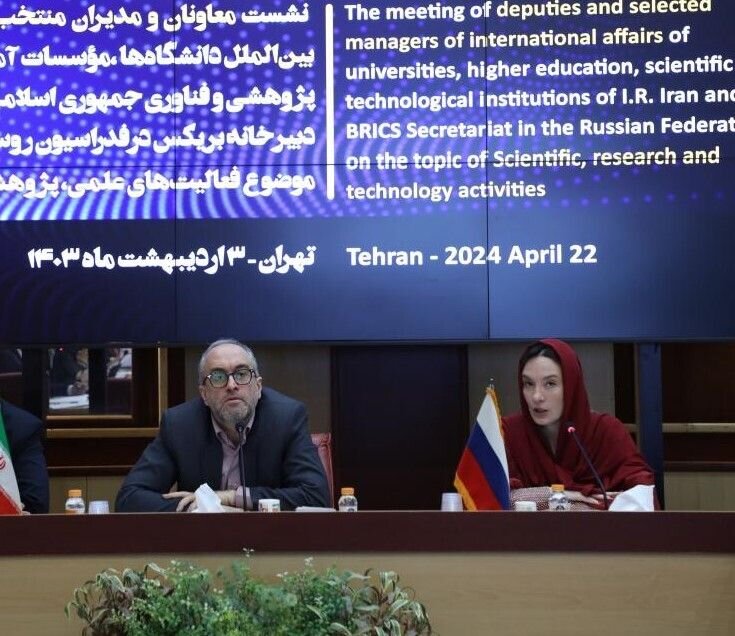Iran, BRICS hold meeting to develop scientific ties

TEHRAN – Representatives from Iranian universities and higher education institutes and the BRICS Expert Council held a meeting in Tehran on Tuesday to discuss ways to expand scientific cooperation.
It was the first meeting held on the topic of scientific research and technological initiatives.
During the meeting, Victoria Panova, head of the council who is also Vice-Rector of HSE University in Russia, and Omid Rezaei-Far, an official with the Ministry of Science, Research and Technology, explored avenues to boost the scientific and technological ties, IRIB reported.
“Despite cruel sanctions, Iran has achieved many accomplishments in agriculture, biotechnology, technology, and engineering sciences fields,” IRIB quoted Panova as saying.
She also noted that unlike what is imagined, the BRICS group is not merely an economic group, it is here to introduce the high capacity of the BRICS in terms of science and technology as well.
Panova went on to emphasize Iran’s capabilities and readiness to expand scientific cooperation with member states of this international organization.
Rezaei-Far, for his part, said the working groups will be established soon and aligned with BRICS educational activities; academic members of each working group will collaborate with BRICS to fulfill its goals.
Highlighting the high scientific capabilities of Iranian universities and science and technology parks, Rezaei-Far announced Iran’s readiness to participate in BRICS scientific endeavors, particularly skill training courses with an emphasis on innovation and technology.
The BRICS group, comprised of Brazil, Russia, India, China, and South Africa was established in 2009. It has emerged as a significant force shaping global economic discussions.
Iran, alongside Argentina, Egypt, Ethiopia, the UAE, and Saudi Arabia, received an invitation to join this influential bloc effective January 1, 2024, signaling a significant transformation in the geopolitical arena.
Russia chairs the BRICS group in 2024.
Global ranking
SCImago Institutions Rankings (SIR) 2024 placed 197 Iranian universities among the top institutions in the world compared to 194 universities in 2023.
In the latest ranking, Tehran University of Medical Sciences (5) and University of Tehran (10) were among the top ten institutions in West Asia. They were ranked 6th and 11th, respectively, in the 2023 ranking.
The 14th edition of the Quacquarelli Symonds (QS) World University Rankings by Subject 2024 included 17 Iranian universities in 17 subject entries, compared with 16 universities in 2023.
University of Tehran (346), Sharif University of Technology (401- 450) in Engineering and Technology; Tehran University of Medical Sciences (358), Mashhad University of Medical Sciences (451- 500), University of Tehran (451- 500), and Shiraz university of medical sciences (501 – 550) in Life sciences and Medicine; and University of Tehran (401-450), and Sharif University of Technology (501-550) in Natural Science are the top universities
URAP World Ranking is based on six academic performance indicators including number of articles, citations, total document, scientific productivity, research impact, and international collaboration.
In the academic performance ranking of 71 universities in Iran, Tehran University was ranked first nationally with a global rank of 231, IRNA reported.
Tehran University of Medical Science (277), and Shahid Beheshti University of Medical Science (436) were ranked second and third, respectively.
BRICS Expert Council
The BRICS Expert Council–Russia, based at HSE University, was initiated by the Russian Ministry of Foreign Affairs and the Russian Ministry of Finance and established by order of the Government of the Russian Federation.
Its purpose is to provide information, analytical, and expert support for Russia's participation in BRICS, particularly for preparing expert events held as part of the Russian BRICS chairship in 2024.
Its key tasks involve conducting expert, analytical, and research activities and providing organizational support on relevant political, socio-economic, and humanitarian cooperation issues within BRICS.
Facilitating international scientific and expert cooperation on multidisciplinary issues within BRICS, and disseminating the results of the Centre's expert, analytical, and research activities, including through the preparation of scientific reports and articles, organizing and/or participating in reputable scientific and research-to-practice conferences, seminars, and expert round tables are among its other goals.
MT/MG
Leave a Comment